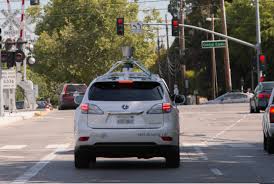
There is a race between carmakers and technology companies to develop "robotaxis" which can be called up via smartphone and paid for by the minute and this race is set to get intensified a few notches more as Fiat Chrysler is slated to join an alliance led by BMW engaged for the development of self-driving cars.
Because of the fact that younger customers are abandoning car ownership in favor of a pay-per-use mobility service, therefore, according to consultants McKinsey, this market for such self-driving cabs could be worth $2 trillion by 2030.
In what is a matching timeframe that is shared by rival companies who are also developing self-driving cars, Fiat Chrysler (FCA) said that it plans to put autonomous car technology into production by 2021.
Paving the way to creating an industry-wide autonomous car platform which other carmakers could adopt, BMW and its partners Intel and Mobileye said FCA would bring engineering and other expertise to the deal.
According to consulting firm Frost & Sullivan, autonomous cars will make up about 10 to 15 percent of vehicles in Europe by 2030 and with that market in mind, automakers are seeking alliances to share the high costs of developing autonomous cars.
The "synergies and economies of scale" possible in joining the alliance were cited by FCA Chief Executive Sergio Marchionne.
In order to survive the prohibitively high costs of making more technologically advanced vehicles, automakers must merge, and this what Marchionne has long argued for.
Because of the fact that "banking all of our solutions on one possible outcome is going to be disastrous", FCA was looking for new partners in self-driving development, he had said in April.
With the aim of developing self-driving cars based on Chrysler Pacifica hybrid minivans, FCA is also part of a separate alliance with Alphabet Inc's self-driving unit Waymo.
At present the global taxi market is run by fleet operators and ride-hailing firms and hence autonomous cars will allow carmakers to disrupt the that taxi market. Ride hailing would be able to compete against other forms of transport including buses and could become more cost effective because with autonomous cars, there would be no need to pay drivers.
According to Goldman Sachs, once autonomous robotaxis are in operation, the ride-hailing services could grow eightfold to $285 billion by 2030, which at the present moment make up around 33 percent of the global taxi market.
Also joining the BMW-Intel alliance was auto suppliers Delphi Automotive and Continental. The consortium said that it would learn from the 100 test vehicles to be deployed by Mobileye in the United States later this year and was on track to put 40 self-driving test vehicles on the road by the end of 2017.
(Source:www.reuters.com)
Because of the fact that younger customers are abandoning car ownership in favor of a pay-per-use mobility service, therefore, according to consultants McKinsey, this market for such self-driving cabs could be worth $2 trillion by 2030.
In what is a matching timeframe that is shared by rival companies who are also developing self-driving cars, Fiat Chrysler (FCA) said that it plans to put autonomous car technology into production by 2021.
Paving the way to creating an industry-wide autonomous car platform which other carmakers could adopt, BMW and its partners Intel and Mobileye said FCA would bring engineering and other expertise to the deal.
According to consulting firm Frost & Sullivan, autonomous cars will make up about 10 to 15 percent of vehicles in Europe by 2030 and with that market in mind, automakers are seeking alliances to share the high costs of developing autonomous cars.
The "synergies and economies of scale" possible in joining the alliance were cited by FCA Chief Executive Sergio Marchionne.
In order to survive the prohibitively high costs of making more technologically advanced vehicles, automakers must merge, and this what Marchionne has long argued for.
Because of the fact that "banking all of our solutions on one possible outcome is going to be disastrous", FCA was looking for new partners in self-driving development, he had said in April.
With the aim of developing self-driving cars based on Chrysler Pacifica hybrid minivans, FCA is also part of a separate alliance with Alphabet Inc's self-driving unit Waymo.
At present the global taxi market is run by fleet operators and ride-hailing firms and hence autonomous cars will allow carmakers to disrupt the that taxi market. Ride hailing would be able to compete against other forms of transport including buses and could become more cost effective because with autonomous cars, there would be no need to pay drivers.
According to Goldman Sachs, once autonomous robotaxis are in operation, the ride-hailing services could grow eightfold to $285 billion by 2030, which at the present moment make up around 33 percent of the global taxi market.
Also joining the BMW-Intel alliance was auto suppliers Delphi Automotive and Continental. The consortium said that it would learn from the 100 test vehicles to be deployed by Mobileye in the United States later this year and was on track to put 40 self-driving test vehicles on the road by the end of 2017.
(Source:www.reuters.com)














